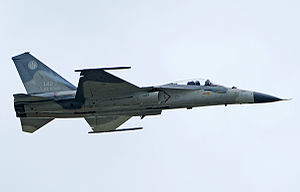F-CK-1
| F-CK-1 Ching-kuo | |
|---|---|
 |
|
| ROCAF F-CK-1A flying | |
| Role | Fighter aircraft |
| National origin | Taiwan (Republic of China) |
| Manufacturer | Aerospace Industrial Development Corporation |
| First flight | May 28, 1989 |
| Introduction | January 1994 |
| Status | Active service |
| Primary user | Republic of China Air Force |
| Produced | 1990–2000 (A/B Models) |
| Number built | 130 |
| Unit cost |
US$25 ~ $30 million (initially plan of 250 units)
|
The AIDC F-CK-1 Ching-kuo (經國號戰機), commonly known as the Indigenous Defense Fighter (IDF), is a multirole combat aircraft named after Chiang Ching-kuo, the late President of the Republic of China (Taiwan). The aircraft made its first flight in 1989. It was delivered to Republic of China Air Force in January 1994 and entered service in 1997. All 130 production aircraft had been manufactured by 1999.
The IDF program was initiated when the United States refused to sell F-20 Tigershark and F-16 Fighting Falcon jet fighters to Taiwan following diplomatic pressure from China. Taiwan therefore decided to develop an advanced indigenous jet fighter. The IDF jet fighter project was designed and built by the Aerospace Industrial Development Corporation (AIDC) based in Taichung, Taiwan.
The preliminary search for a replacement for the ROCAF's F-5s and F-104s began with the XF-6 indigenous fighter project, later renamed Yin Yang, in the late 1970s. After the US established formal relations with China and ended the Mutual Defense Treaty with Taiwan, President Chiang Ching-Kuo decided to expand the indigenous defense industry and on August 28, 1980, ordered AIDC to design an indigenous interceptor. Originally, the ROCAF listed the priority of the XF-6 behind the XA-3 Lei Ming single seat attack aircraft, due to the believed high risks of the XF-6 project.
...
Wikipedia
